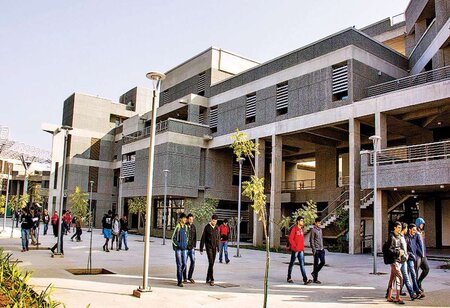IIT Gandhinagar research scholars wins the Gandhian Young Technological Innovation Awards 2021
 In a twin achievement by the research scholars at IIT Gandhinagar, Harini Gunda, a PhD student of Chemical Engineering, has won SRISTI-GYTI Award 2021, and Dr Chandan Kumar Jha, a PhD alumnus and now a postdoctoral fellow in Electrical Engineering, has won BIRAC SITARE-GYTI Appreciation Award 2021.
In a twin achievement by the research scholars at IIT Gandhinagar, Harini Gunda, a PhD student of Chemical Engineering, has won SRISTI-GYTI Award 2021, and Dr Chandan Kumar Jha, a PhD alumnus and now a postdoctoral fellow in Electrical Engineering, has won BIRAC SITARE-GYTI Appreciation Award 2021.
About the Gandhian Young Technological Innovation (GYTI) Awards
Gandhian Young Technological Innovation (GYTI) Awards celebrate the spirit of student innovation in all the fields of engineering, science, technology and design through extremely affordable/frugal solutions or the ones that push the technological edge for various areas of social and industrial applications.
The awards are announced every year under two categories, 1) SITAREGYTI given by Biotechnology Industry Research Assistance Council (BIRAC), Department of Biotechnology (DBT) and 2) SRISTI-GYTI given by SRISTI.
The award recipients are selected after a rigorous review process by eminent professors and scientists in respective fields, who assess the entries from all over the country.
Why did Harini Gunda from IIT Gandhinagar receive the award?
Harini has received this award for developing ‘Novel Boron Nano-additives for Improving the Performance of Solid Propellants’.
This innovation is part of her PhD under the supervision of Prof Kabeer Jasuja (Dr Dinesh O Shah Chair Associate Professor, Chemical Engineering) in collaboration with Prof Chinmay Ghoroi (B S Gelot Chair Professor, Chemical Engineering) at IIT Gandhinagar.
These new boron-rich nanomaterials are a promising single substitute for multiple fuel additives used in space and defence applications because they result in a superlative enhancement in the performance of solid propellants used in rocket propulsion systems.
Moreover, this new nano-additive takes only 1 wt.% compared to 30 wt.% of the total weight taken by conventional fuel additives.
This can help to carry additional payload in a defence aircraft or more satellites into the space orbit.
The synthesis methodology developed by her is easily scalable and economical making it more promising in the market. The team estimates that its production will also be 40 times cheaper than the conventional additives.
Sharing her thoughts on this achievement, Harini Gunda said, “It is a great honour and privilege for me to receive the prestigious SRISTI-GYTI Award 2021.”
“I am thankful to IITGN for providing the world-class research environment and especially thankful to my advisor for giving me the freedom and support to explore out of the box,” she said.
“Developing energy-efficient fuels for both defence and space applications is the need of the hour to meet our nation’s targets and be among the top space-faring nations,” she added.
Why did Dr Chandan Kumar Jha from IIT Gandhinagar receive the award?
Chandan has received the award for developing ‘An Intelligent Hand Rehabilitation and Assessment System for Stroke Patients’.
It is a highly sensitive and reliable instrumented glove that uses fibre-optic sensor technology to assist stroke patients in performing various hand exercises efficiently to enable faster recovery from their disability.
This innovation was developed by Chandan during his PhD under the supervision of Dr Arup Lal Chakraborty (Professor, Electrical Engineering) in the Photonic Sensors Lab at IIT Gandhinagar.
Unlike other existing commercial gloves, this device can measure finger joint angles with high accuracy and repeatability, which can be very useful for monitoring hand movement of stroke patients for rehabilitation.
Earlier, Chandan has received many accolades for this useful innovation.
Sharing his thoughts, Dr Chandan Kumar Jha said, “I feel humbled and honoured to receive this award for my work.”
“I would like to thank the BIRAC SITARE-GYTI Award committee, my mentors and my team at IITGN for extending all the support and guidance throughout the development of this system. With our innovation, we wish to bring a change in the lives of stroke patients,” he added.

